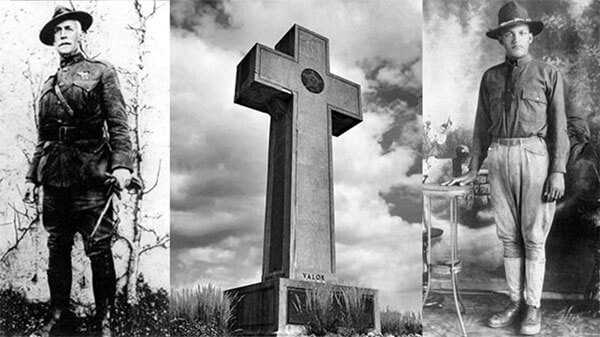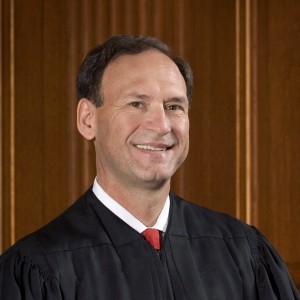 WASHINGTON — The U.S. Supreme Court has ruled against a humanist organization and overturned an appeals court ruling that declared a World War I veterans memorial unconstitutional, declaring that “[a] government that roams the land, tearing down monuments with religious symbolism and scrubbing away any reference to the divine will strike many as aggressively hostile to religion.”
WASHINGTON — The U.S. Supreme Court has ruled against a humanist organization and overturned an appeals court ruling that declared a World War I veterans memorial unconstitutional, declaring that “[a] government that roams the land, tearing down monuments with religious symbolism and scrubbing away any reference to the divine will strike many as aggressively hostile to religion.”
“For nearly a century, the Bladensburg Cross has expressed the community’s grief at the loss of the young men who perished, its thanks for their sacrifice, and its dedication to the ideals for which they fought,” Justice Samuel Alito wrote on behalf of the majority.
“It has become a prominent community landmark and its removal or radical alteration at this date would be seen by many not as a neutral act but as the manifestation of ‘a hostility toward religion that has no place in our Establishment Clause traditions.’”
Justices Ruth Bader Ginsburg and Sonia Sotomayor dissented.
BACKGROUND
As previously reported, the Bladensburg memorial, also known as the “peace cross,” was erected in 1925 by The American Legion to honor the lives of 49 men from Prince George County who died during the war.
The cross stands 40 feet tall in Memorial Park, and also features a plaque that reads, “The right is more precious than the peace; we shall fight for the things we have always carried nearest our hearts; to such a task we dedicate ourselves.” The site is mainly used by The American Legion for Memorial Day and Veterans Day celebrations.
The American Humanist Association (AHA) sued the Maryland-National Capital Park and Planning Commission in 2014 over the presence of the cross, alleging that it violated the First Amendment to the United States Constitution.
“When the government erects an exclusively Christian monument on government property, it violates this central command of the Establishment Clause by sending a clear message that Christianity is the preferred religion over all others,” said AHA attorney Monica Miller in a statement surrounding the filing of the suit.
In November 2015, U.S. District Judge Deborah Chasanow, appointed to the bench by then-President Bill Clinton, ruled that the Bladensburg cross monument is constitutional because it is used for nonreligious purposes and is meant to honor war vets rather than promote any religious message.
“The monument’s secular commemorative purpose is reinforced by the plaque, The American Legion’s seal, and the words ‘valor,’ ‘endurance,’ ‘courage,’ and ‘devotion’ written on it. None of these features contains any religious reference,” she wrote. “[The construction of the cross] was not an attempt to set the imprimatur of the state on a particular creed. Rather, those who erected the cross intended simply to honor our nation’s fallen soldiers.”
APPEAL COURT RULING: MAJORITY AND DISSENT
AHA then filed an appeal with the Fourth Circuit Court of Appeals, which ruled 2-1 in October 2017 that the veterans memorial is unconstitutional. It said that because there are no other religious symbols in the park, the memorial sends the message that the government favors Christianity over other religions and “excessively entangles” the government with religion.
“Although the reasonable observer may recognize that the cross is located in the Veterans Memorial Park, such reasonable observer also could not help but note that the cross is the most prominent monument in the park and the only one displaying a religious symbol,” wrote Judge Stephanie Thacker, nominated to the bench by then-President Barack Obama.
“Further, the reasonable observer would know that a Latin cross generally represents Christianity. These factors collectively weigh in favor of concluding that the cross endorses Christianity — not only above all other faiths, but also to their exclusion,” she asserted.
Judge Roger Gregory, nominated by then-President Bill Clinton, dissented, opining that most observers would simply consider the display as a veterans memorial and not the promotion of religion. He noted that the courts have ruled that it is not necessary to scrub all traces of religion from public life in order to remain neutral.
“We must be careful not to push the Establishment Clause beyond its purpose in search of complete neutrality,” Gregory warned. “‘[U]ntutored devotion to the concept of neutrality can lead to invocation or approval of results which partake not simply of that noninterference and noninvolvement with the religious which the Constitution commands,’ but of extreme commitment to the secular, ‘or even active, hostility to the religious.’”
A request for an en banc — or full appeals court — rehearing was denied, but not without strong dissent from Judge Paul Neimeyer, appointed to the bench by then-President Ronald Reagan.
“The panel … will now have the monument removed or destroyed because, as it concludes, its presence on public land amounts to a violation of the Establishment Clause, although no Supreme Court case has ever held that the Establishment Clause prohibits such monuments,” he lamented.
“Indeed, it has held to the contrary — that ‘the Establishment Clause of the First Amendment allows the display’ of monuments like the one here.”
ALITO: PINNING DOWN ESTABLISHMENT CLAUSE MEANING A ‘VEXING PROBLEM’
According to The Washington Post, more than 100 members of Congress joined an amicus brief to the U.S. Supreme Court in support of the cross memorial, as did Maryland Gov. Larry Hogan and Attorney General Brian Frosh.
The religious liberties organization Alliance Defending Freedom (ADF) also submitted a brief on behalf of several veterans groups, including Patriot Outreach, The Edwin A. Schumacher Marine Corps League, Detachment 740; The Society of 40 Men and 8 Horses Voiture 1543, and Maj. Gen. Patrick Brady (U.S. Army, retired).
“Because the less-religious alternative standard naturally whitewashes religious symbols from the public square,” the brief read in part, “this court should grant certiorari and reaffirm that the Establishment Clause ‘does not oblige government to avoid any public acknowledgement of religion’s role in society,’ and that it does not ‘require eradication of all religious symbols in the public realm.’”

In its ruling on Thursday, the U.S. Supreme Court conceded that there are difficulties with understanding the exact intention and meaning of the Establishment Clause and that even one of its own rulings on the subject poses an issue.
“While the concept of a formally established church is straightforward, pinning down the meaning of a ‘law respecting an establishment of religion’ has proved to be a vexing problem,” Justice Alito wrote.
He remarked that the “Lemon” test, which is used as the standard for Establishment Clause cases — based on the 1971 ruling of Lemon v. Kurtzman, is not without “shortcomings.”
“It could not ‘explain the Establishment Clause’s tolerance, for example, of the prayers that open legislative meetings, . . . certain references to, and invocations of, the Deity in the public words of public officials; the public references to God on coins, decrees, and buildings; or the attention paid to the religious objectives of certain holidays, including Thanksgiving,” he explained.
“The test has been harshly criticized by members of this court, lamented by lower court judges, and questioned by a diverse roster of scholars,” Alito noted.
He also pointed to other monuments that have been upheld by the court that are of both a religious and secular nature, such as the Texas Ten Commandments monument in Orden v. Perry.
“For believing Jews and Christians, the Ten Commandments are the word of God handed down to Moses on Mount Sinai, but the image of the Ten Commandments has also been used to convey other meanings. They have historical significance as one of the foundations of our legal system, and for largely that reason, they are depicted in the marble frieze in our courtroom and in other prominent public buildings in our nation’s capital,” Alito exemplified.
He further noted, “Religion undoubtedly motivated those who named Bethlehem, Pennsylvania; Las Cruces, New Mexico; Providence, Rhode Island; Corpus Christi, Texas; Nephi, Utah, and the countless other places in our country with names that are rooted in religion. Yet few would argue that this history requires that these names be erased from the map.”
Alito said that other efforts to remove items that have religious connotations would be seen by the public as hostility toward religion, even if the subject no longer is considered by the everyday person as serving a religious purpose.
“[F]ew would say that the State of California is attempting to convey a religious message by retaining the names given to many of the State’s cities by their original Spanish settlers — San Diego, Los Angeles, Santa Barbara, San Jose, San Francisco, etc. But it would be something else entirely if the State undertook to change all those names. Much the same is true about monuments to soldiers who sacrificed their lives for this country more than a century ago.”
By the end of its 30-plus page ruling, the majority concluded, “The cross is undoubtedly a Christian symbol, but that fact should not blind us to everything else that the Bladensburg Cross has come to to represent. For some, that monument is a symbolic resting place for ancestors who never returned home. For others, it is a place for the community to gather and honor all veterans and their sacrifices for our nation. For others still, it is a historical landmark.”
“For many of these people, destroying or defacing the cross that has stood undisturbed for nearly a century would not be neutral and would not further the ideals of respect and tolerance embodied in the First Amendment. For all these reasons, the cross does not
offend the Constitution.”
The First Liberty Institute, which co-represented The American Legion in court, rejoiced at the outcome of the decision.
“This is a landmark victory for religious freedom. The days of illegitimately weaponizing the Establishment Clause and attacking religious symbols in public are over,” President Kelly Shackelford said in a statement. “Our Founders would have been appalled at this attempt to make the government hostile to our religious heritage, history, and symbols. The attempted perversion of our Constitution is now over …”
Become a Christian News Network Supporter...


